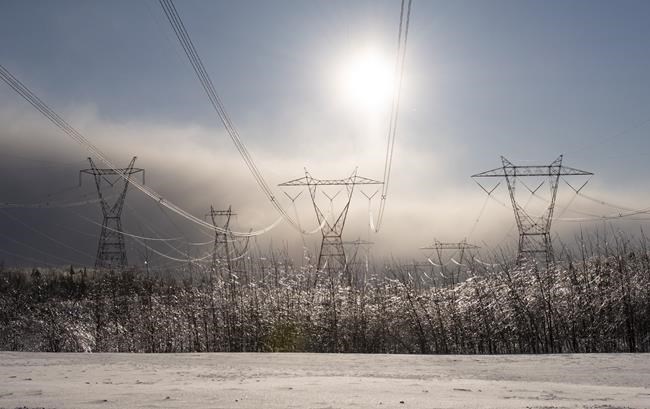MONTREAL — Maine residents have voted No to having a Hydro-Québec transmission line pass through the state, but Quebec Premier François Legault said Wednesday he is still confident the utility's $10-billion export contract to Massachusetts will come to pass.
Legault told reporters on the sidelines of the COP26 climate talks in Scotland that he knew the results of the referendum would be tight, adding that there are other options on the table and the governor of Massachusetts is determined to see the agreement through.
"Nothing is certain in life, but I am confident that it will get done," Legault said. "There are different scenarios; for now I can't give more details. There are different routes you can take to get to Massachusetts."
The results of Tuesday's referendum in Maine were a stinging setback for the Crown corporation and the Legault government's plan to make Quebec the "battery of North America." The contract is worth $10 billion over 20 years to the public utility.
Funded by Massachusetts ratepayers, the New England Clean Energy Connect would supply up to 1,200 megawatts of Canadian hydropower to the New England power grid. That’s enough electricity for one million homes. Hydro-Québec has said the project would cut three million metric tonnes of greenhouse gas emissions per year — the equivalent of taking 700,000 cars off the road.
It wasn't enough to convince voters in Maine, however, where nearly 60 per cent of voters rejected the project.
Maine's major environmental groups aren't convinced of the benefits and raised concerns about the impact of the proposed power lines through the northern part of the state, particularly the 85 kilometres of new lines that would cross the North Maine Woods.
Three-quarters of trees had already been removed for the project, which calls for a transmission line that mostly follows existing utility corridors.
Work has been underway since last winter. Central Maine Power (CMP), Hydro's partner building the line in Maine, has already spent more than US$350 million on the US$1-billion project. On Wednesday, workers at New England Clean Energy Connect (NECEC), a division of CMP, continued construction of the line, spokesman Ted Varipatis said.
The continued construction drew the ire of opponents, who could head to court. "It's low, even for CMP," said Adam Cote, a Portland lawyer who represents opponents of the projects. “The citizens of Maine do not want this line and we will do everything in our power to hold CMP accountable."
The project has sparked unprecedented polarization in Maine politics. Various lobbyists spent a total of US$94 million to influence voters, according to documents filed with the Maine Ethics Commissioner — a record amount for a referendum in the state.
Energy competitors are accused of having stoked the fears of citizens by financing opposition to the project. A Florida-based company called NextEra spent more than $20 million encouraging voters to block the project. NextEra operates a nuclear plant in New Hampshire that would face competition from the cheaper electricity carried by the Hydro-Québec line.
Sandi Howard, director of the group No CMP Corridor, called on Central Maine Power to respect the people’s will and halt the project.
“The vote sends a message to CMP that Mainers want to reject this corridor. They want to preserve the integrity of western Maine,” she said. “Mainers clearly don’t trust CMP to develop a project of this magnitude."
Other Maine residents were frustrated that the referendum took place at all, saying it was bad public policy to retroactively vote down a project already approved by multiple state and federal agencies.
Clean Energy Matters, a group largely funded by CMP, called the referendum unconstitutional.
“We believe this referendum, funded by fossil fuel interests, is unconstitutional," Jon Breed, executive director, said in a statement. "With over 400 Maine jobs and our ability to meet our climate goals on the line, this fight will continue.”
Quebec Energy Minister Jonatan Julien told reporters Wednesday in Quebec City the project should be completed because all authorizations have been granted and work is underway. A spokesperson for Hydro-Québec, meanwhile, said it would take legal action.
Anthony Moffa, professor of environmental law at the University of Maine School of Law, said CMP could argue in court that it has acquired rights as work has already started and the project has the required permits but added it's unclear if the courts will accept that interpretation.
Democratic Gov. Janet Mills, who favours the project, will not be able to oppose the results. The governor's veto power cannot be used to overturn results of a referendum, Moffa said, adding that unless the courts intervene, the text of the referendum question would become law within 30 days.
The referendum results mark the second recent setback for Hydro-Québec's plan to export power to the United States. In 2019, the utility abandoned a plan to export power through New Hampshire because of public opposition.
This report by The Canadian Press was first published Nov. 3, 2021.
— With files from The Associated Press and Jocelyne Richer in Quebec City.
Patrice Bergeron and Stéphane Rolland, The Canadian Press



